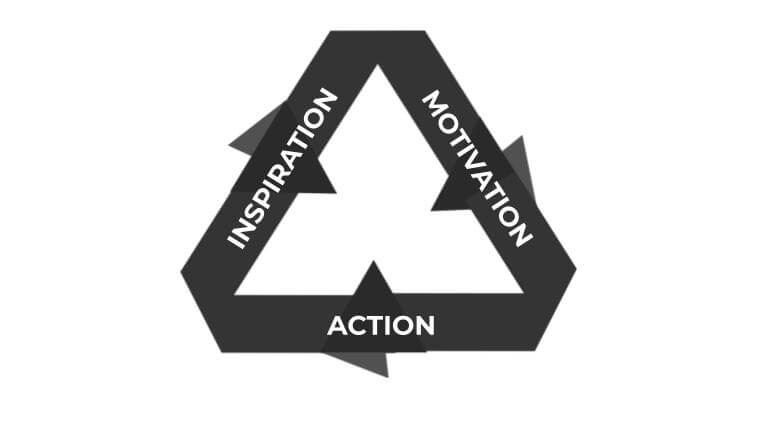Setting motivating goals is the key to making progress in life.
If your goals don’t motivate you, it’s going to be hard to get excited about them, and push through the more challenging days or things you need to do.
In this article, you’ll get a step-by-step system to set goals that give you energy and get you fired up in the morning. It also doesn’t take weeks so you can focus on executing versus planning. Depending on how deep you want to go, you can do this in less than an hour.
This system is a condensed version from a lot of literature I’ve read. I’ll leave some further resources at the end of the article if you’d like more info. It combines using your emotional motivations with your logical planning mind to actually get what you want in life.
Let’s get started.
[lwptoc]1. Give yourself some space
It’s best if there’s nothing else on your plate that’s pressing to do today when you’re running through this process.
A great time to do it is one day while on vacation, when you’re out of the “day-to-day” hustle and fast movement of life. It’s hard to get perspective when you’re stuck in the weeds.
It’s hard to get perspective when you’re stuck in the weeds.
The more you feel like you have all the space you need, the less you’ll feel pressured to get this done as soon as possible, and the more your brain can relax so you can listen to what it wants.
2. Center yourself for 5-10 minutes
I recommend doing some simple breathing exercises or a short meditation to quiet your mind and get yourself centered here and now before you set goals.
You’ll want your focus to be in the present and it’s hard to do that if your mind is rushing around a lot.
Take a few minutes, let go of all the other things to do, and be right here, right now.
3. Take 10-20 minutes to write out all the things you want or the feelings that are pulling you
Take out a blank piece of paper and set a timer for 10-20 minutes where you just let your mind go and brainstorm everything you feel you want in your life.
The point here is to just go for stream of consciousness writing and not overthink too much. Try to get in touch with what drives you toward a goal.
You might have something specific like “Get a Master’s degree”, or something a bit less tangible like “Feel more independent.”
Don’t filter, don’t edit. You’ll do that later on in the process. Give yourself permission to write out everything unedited even if it doesn’t “make sense.”
4. Filter out the items you have motivation to do and that are in your control
Review what you wrote down. You may find some items that you wrote down but don’t really want to pursue that much.
A good measure of how much you want each of these items is to visualize obtaining them one-by-one if you’re unsure.
What emotions come up when you get each one? How do you look? How will your life change?
If visualizing an item makes you feel amazing, it’s a good sign that you really want it. If you don’t feel a huge pull, that’s a sign it’s probably better to set it aside.
Cross out any items you don’t want to move forward with.
5. Break the desires into short, medium, and long term goals

For some goals you might be able to accomplish them in a week (i.e., “Buy a couch”), but other things may take years (i.e., “Buy a house”).
It can help to focus your attention on the most pressing/important goals to you by creating three columns and sorting things into them.
You might choose different time lengths, but a suggestion could be:
- Short term (today to a month)
- Medium term (a month to a year)
- Long term (more than a year)
6. Prioritize your list to set goals
The reality of living is that you only have so much time in your life.
It is impossible to do everything right now, and trying to do so is a recipe for burnout and disappointment.
These two questions from Tim Ferriss have helped me time and time again when I need to prioritize:
- What thing, if accomplished this day/week/month/year/life…would make me feel accomplished?
- What thing, if accomplished, would make everything else easier?
1. What thing, if accomplished this day/week/month/year/life…would make me feel accomplished?
2. What thing, if accomplished, would make everything else easier?
You may pick everything from your “Short term” list, or perhaps a few from all different time categories. Choose items where at least you can say, “Yes”, when answering the Tim Ferriss questions.
You’ll then need to limit what you’re working on. The fewer goals you choose, the more focused you’ll be, and the higher your chance of accomplishing them. I recommend a maximum of three to five goals for any time duration you’re looking at (e.g. a day, week, month, etc.)
Remember: these goals aren’t going anywhere! Once you finish what you’re working on you can just come back and pick the next one up.
7. Brainstorm a list of action steps leading to accomplish the goal or solve your feelings
For whatever goal or feeling you’re looking at, think of all the action steps you could take to solve it.
Don’t worry about things making total sense if you need to do something first before another thing, just what you could do to solve it.
This should be pretty easy for something like “Get a new office chair”, but for something like, “Feel more independent”, it can definitely be more difficult.
This is again where brainstorming in an unfiltered way helps.
With the, “Feel more independent”, I could write:
- Get my own place
- Get my own car
- Start a side business to make more money
- Try to solve things on my own first before asking people for help
- Etc.
8. Order the action steps into what you should do first that are completely within your control, or turn them into things that are actionable if not right now
As David Allen, author of Getting Things Done points out, most people struggle with productivity because they don’t describe things in discrete, physical action steps that can be done.
Above, we started writing out ideas for, “Feel more independent”, but now is the time to turn them into things you can actually do. Otherwise, you’ll feel stuck and struggle.
You’ll also want to delete anything not actionable or not 100% within your control and order them now by what you want to do first.
For example, if my goal for the week was, “Publish motivating goals article”, the steps would be:
- Determine keyword for article
- Create Google doc for writing
- Create outline
- Review outline
- Write draft
- Review and edit draft
- Upload to WordPress
- Publish
There are further steps within the above, but I’m just keeping it short here!
The more you break things down, the easier it is for your brain to actually accomplish the goal. Your brain HATES big, scary, unclear projects and goals, and it will procrastinate or choose something way easier if it can.
It loves things broken down into items that take shorter amounts of time.
Now, you might have noticed I said choose actions that are completely within your control. What I mean by this is don’t list things you can’t do yourself.
Choose actions that are completely within your control.
For example: If you want to find a job, you shouldn’t write down, “Ace every interview.” You can’t control if the person interviewing you is feeling that day, for example. They might just not hire you because they’re in a bad mood, unfortunately.
What you CAN control is learning how to answer common interview questions and having a great resume so that you have a good shot at acing every interview by actions you can control.
Make sure any goal you set out to accomplish has action steps tied to it that are completely within your control.
9. Define the rewards for accomplishing these items to help you stay motivated
It’s great to come up with a list of goals.
But motivation is fleeting, it doesn’t last.
Having a compelling “why” for what you’re doing helps, but humans are simple creatures: we like getting rewards for doing stuff!
Sometimes just finishing a project is rewarding enough that you’ll feel amazing afterwards. But having something you know you’ll give yourself, or get at the end can really help boost you.
Maybe it’s a nice dinner, a new gadget, or something else. Choose whatever works for you.
Make sure the reward is proportionately sized to your goal, however. In other words, if your goal is to get a shoe rack built, don’t go out afterwards and buy yourself a car.
10. Store everything in a central location

You’ll want to dump all your goals, breakdowns, rewards, etc., somewhere that:
- Makes sense to you/you’ll want to use
- You can easily find if needed
- Is protected (i.e. if you do digital, put it on a cloud server or external backup drive so that the chance of losing something is pretty low)
In terms of how you organize things that’s completely up to you and your personality. It’ll probably evolve over time as well.
My suggestion would be to start simply with just creating a spreadsheet, where every new tab is a goal, and you just list out the breakdown of things to do inside each one.
11. Set aside time to regular review your goals and progress
As I mentioned before, it’s extremely hard to get perspective when you’re in the thick of the day-to-day. You need to set aside specific time to review your progress and goals.
The cadence of this is up to you. I like doing a short weekly review of how I’m feeling and doing, and a more in-depth review every month and quarter. Every year I’ll also sit down and plan to spend a day thinking about how the past year went and what I want to accomplish this year.
The point is to choose a cadence that works for you and commit to it. If you don’t set aside the time it won’t happen, so make sure to do it!
How to stay motivated on your journey
Sometimes, even with the best plans, it can be hard to figure out the key to staying motivated.
Motivation comes and goes.
You won’t always feel like pressing forward with your life. There will be challenges, setbacks, and aggravations.
You won’t always feel like pressing forward with your life. There will be challenges, setbacks, and aggravations.
Here are some tips to keep your motivation going when you feel like you’re struggling.
1. Use the “Do Something” principle
Most people believe that motivation follows a linear process: you get inspiration, which leads to motivation, and then you take action.
But this is flawed thinking because we all lose motivation at times. We all stop feeling inspired.
Mark Manson proposed that inspiration, motivation, and action are actually all linked together in a constant loop, so that if you do/have one, it leads to the next.

Source: Mark Manson.
In other words the next time you don’t feel inspired, just do something, anything related to your goals, even if it’s small.
If it’s writing a book, say you just need to write one line. If it’s cleaning your house, pick up one piece of paper. A trick that really works well is to pair actions related to your goal to some automated habits that you already do, like brushing your teeth.
Just taking that little action might inspire you to take action somewhere else, or to a greater extent (e.g. writing one line turns into a couple of pages).
2. Call a friend
We all have times when our own internal dialogue is not going to be the most friendly or supportive.
At times, our mind can be our own worst enemy.
Calling a friend or support person is one of the fastest ways to get out of a funk or thinking loop when you’re lacking inspiration.
3. Set up accountability
Accountability is one of the best ways to get things done. If you’re struggling, try one of the following:
- Social accountability, where you tell a friend you’ll do something
- Monetary accountability, where you tell someone, or an accountability group that if you don’t do something, you’ll pay a penalty
- Deadline accountability, where you set a deadline to get something done by a certain time
All three of these can be linked together. For example: where you tell a friend you’ll do something by a certain time and if not, you’ll pay them $100.
4. Use habit stacking
Chaining a habit related to your goals onto another is one of the best ways to build a new habit and get things done.
For example, in keeping with our book writing example, if the habit that leads to your goal is writing for 30 to 60 minutes a day, you choose another habit that’s already automatic so this will either come before or after it.
For example: “After eating breakfast, I sit down to write for 30 minutes.”
Try to stack habits together if you’re having problems moving forward.
5. Build an inspirational archive
Having a compiled list of inspirational quotes, pictures, videos, audio, articles, compliments people have given to you, etc., can really help change your thinking patterns if you’re in a bad way.
If you don’t have one yet, start bookmarking things that brighten your day or get you feeling pumped up. Consider creating a document where you copy and paste text messages or just write out nice things people have said about you.
You can then open up this archive when you’re just not feeling like moving forward to help lift you up.
6. Chart your progress

Humans are visual creatures: we love actually seeing our progress.
It’s hard to keep going when something is intangible and you can’t really “feel” that you are improving at it.
So, how do you solve this problem?
By creating visual progress on the habit you’ve built laddering up to your goal.
If you have a goal to read more books and you’ve figured out that the habit that gets you there is to read 5 pages before bed every night, print out a calendar and check off every night that you’ve done this.
You’ll see how many times you’ve done it, propelling your motivation forward.
7. Set up smaller rewards
If we don’t get any rewards from something, it’s hard to keep going.
If you’re struggling to stay motivated, consider breaking your goal down into smaller parts, and rewarding yourself more frequently.
You can overdo this though in terms of giving yourself TOO much for something that’s TOO easy, so you’ll have to balance carefully.
8. Focus on fewer things: a key to staying motivated

There’s no denying that the world moves faster than ever before. The amount of influx and overwhelm we have to deal with on a daily basis is something generations before us could never have imagined.
While it’s important to set boundaries (you usually don’t have to deal with many of the things that could potentially cause the overwhelm, such as answering text messages right away), it’s a good time to remember the concept of focus.
We can say no to many things, but there are some items, responsibilities, and duties that we need to do (or will be in big trouble if we don’t do).
That said, especially in stressful times, give yourself permission to NOT do some things.
If something is a goal but isn’t important anymore, throw it out.
Don’t keep it for ego’s sake. Don’t keep it to just continue and check a box. Get rid of it and either put something else there that’s a higher priority or give yourself some time back.
As I mentioned in the goal setting process, if you have too much going on, prioritize. Ask the Tim Ferriss prioritizing questions.
You are only a human being and while you can handle a lot, you still have limits and can’t be on 100% of the time.
You can either do 10 things to 10%, or one thing to 100%. The less you have to decide between, the more likely you are to actually get the things done.
9. Remember: your thoughts and emotions can lead you astray and change all the time. Focus on what you know is right to do using your wisdom and values as the guide
Thoughts and emotions come and go, wisdom and values are unchanging and solid.
Thoughts and emotions come and go, wisdom and values are unchanging and solid.
What do I mean by this?
If you practice meditation, you’ll know that your mind is constantly spitting out thoughts: about the past, future, and judging yourself in the present.
Yet so many of these thoughts are a waste.
Think about it: how many times have you worried about something that never came to pass? That your mind was convinced and sure would happen?
If that’s the case, can you trust it?
Moreover with an emotion, you might have felt anxiety while you were seeing those worrying thoughts.
But then the anxiety changed, right? It didn’t stay the same.
But what about your value of solving problems in a non-violent way? Or of treating people with respect?
Or your wisdom gained in knowing that situations that cause anxiety don’t last forever. Those events change.
Your values and wisdom stay with you forever. While you may consciously decide to change your values (e.g. favoring being able to travel more rather than having a more fixed lifestyle), and you gain wisdom with experience, these things are not transient like uncontrollable thoughts (your mind outputs whatever it wants constantly), and emotions which while you can influence, you don’t have full control over. For example: think about when you get up on the wrong side of the bed and are angry for no reason at all.
How does this apply to your goals?
If you want to get fit and go to the gym, your mind might be telling you that missing one day isn’t a big deal. You might feel lazy. But your value of being healthy, and wisdom to know that if you skip one day you’re more likely to skip another, guide you and show you that it’s probably better to just go, today.
Remember what your values are and look to your own wisdom to know what to do.
10. Change your environment
If you feel stuck or paralyzed, try changing your environment. Work from a different room, go to another building, or just take a quick walk outside.
A quick change in environment can work wonders for getting motivated.
11. Be patient
To balance out all of this type-A achieving and planning (I’m making fun of myself here), you’ll need to add in healthy doses of patience and kindness towards yourself while enjoying the process of achieving your goals.
As much as you plan, things will get delayed, you’ll get distracted, and new information will arise that will require you to re-evaluate your goals.

If you start feeling stressed out with your goals as you’ve set them up in your life, remember to step away and take a break.
Always remember though: if your goal isn’t enough to push you through the general obstacles coming up you might want to re-evaluate how important it really is to you.
Exciting goals should make you feel excited, energized, and happy. They should literally pull you through any emotional resistance that you face.
Stay focused, break things down, continue to evaluate how you feel, be patient, and enjoy the process of building a great life pursuing meaningful and motivating goals.
More resources on setting motivating goals
Here are some of my favorite resources on goal setting:
- Goal Setting: A Scientific Guide to Setting and Achieving Goals by James Clear
- Your Goals Are Overrated by Mark Manson
- The Surprising Science of Goal Setting (And Why You’re Probably Doing It Wrong by Mark Manson
- The Build a Better Life Course by Mark Manson

